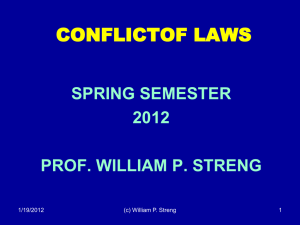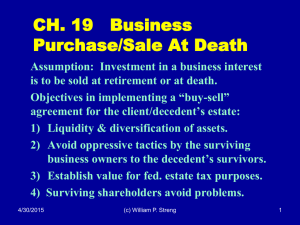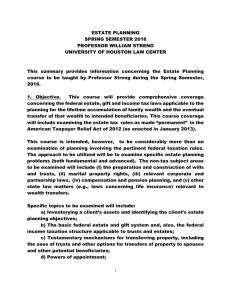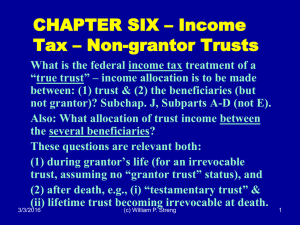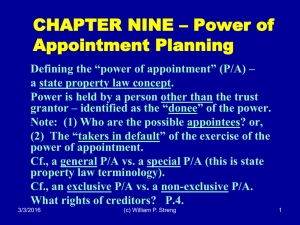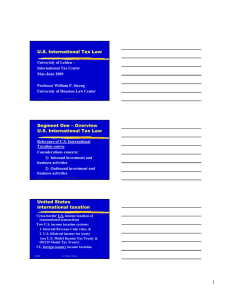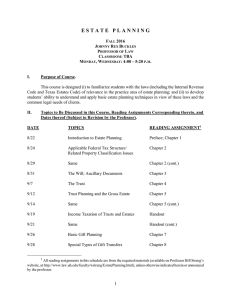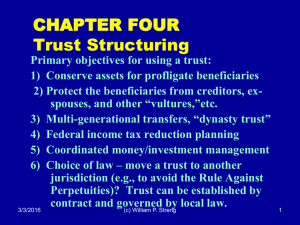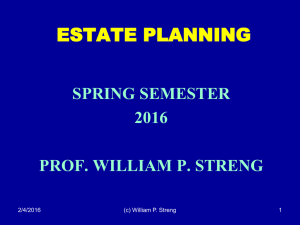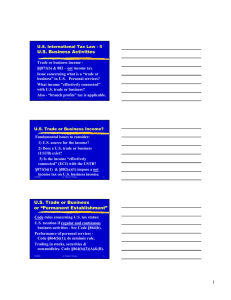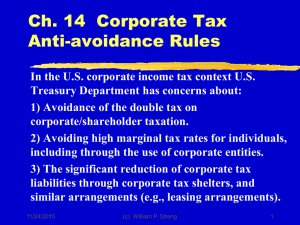U.S. Intl. Tax Law - 2 Residency Status
advertisement
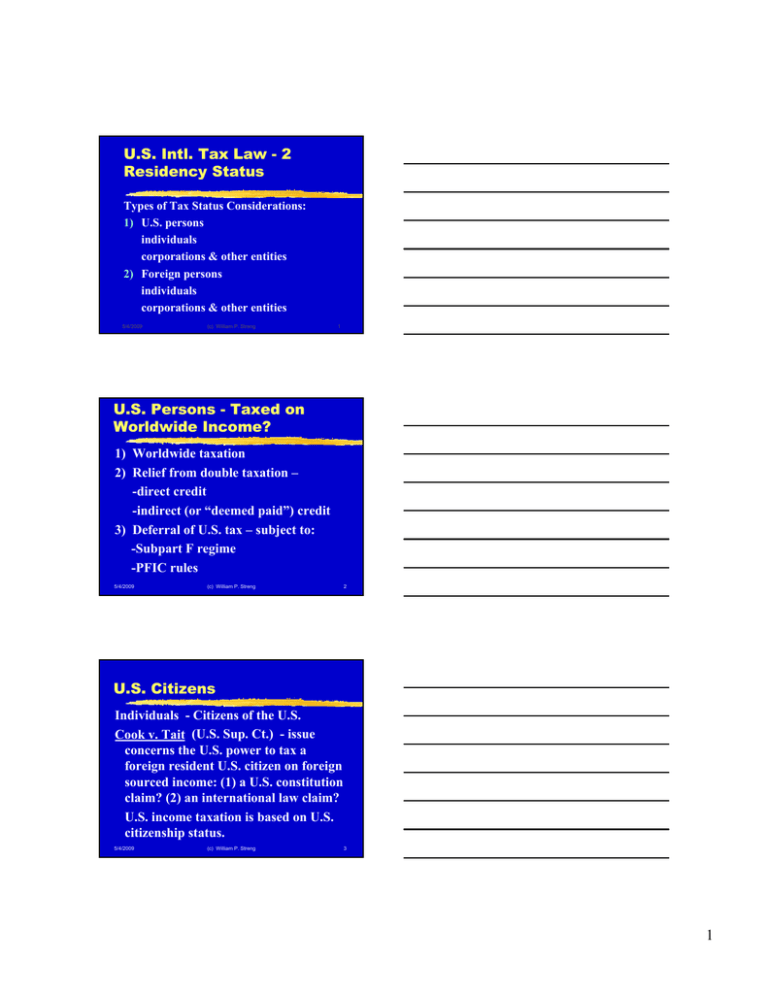
U.S. Intl. Tax Law - 2 Residency Status Types of Tax Status Considerations: 1) U.S. persons individuals corporations & other entities 2) Foreign persons individuals corporations & other entities 5/4/2009 (c) William P. Streng 1 U.S. Persons - Taxed on Worldwide Income? 1) Worldwide taxation 2) Relief from double taxation – -direct credit -indirect (or “deemed paid”) credit 3) Deferral of U.S. tax – subject to: -Subpart F regime -PFIC rules 5/4/2009 (c) William P. Streng 2 U.S. Citizens Individuals - Citizens of the U.S. Cook v. Tait (U.S. Sup. Ct.) - issue concerns the U.S. power to tax a foreign resident U.S. citizen on foreign sourced income: (1) a U.S. constitution claim? (2) an international law claim? U.S. income taxation is based on U.S. citizenship status. 5/4/2009 (c) William P. Streng 3 1 Resident Aliens “Bright Line” Tests §7701(b) definitional provision. (1) “Green card” test, or (2) "Substantial presence" test 122 day test - how computed? (3) "Closer connection" exception §7701(b)(3)(B); less than 183 days in U.S. & tax home in other country. §162(a)(2) re “tax home.” 5/4/2009 (c) William P. Streng 4 Resident Aliens §7701(b) Exceptions Commuters Travelers in transit Diplomats & international organization employees Certain professional athletes Medical condition arising while in U.S. 5/4/2009 (c) William P. Streng 5 Foreign Persons Active Business Income Trade or business income §§871(b) & 882 – net income tax. Issue concerning what is a “trade or business” in U.S. Personal services? What income "effectively connected” with U.S. trade or business? Also - “branch profits” tax is applicable. 5/4/2009 (c) William P. Streng 6 2 U.S. Investment Income of Foreign Persons Investment income taxed - §§871(a), 881(a) Gross withholding “at source” is applicable. Exemption from income tax liability for:portfolio interest; bank interest; capital gains on stock & securities. No U.S. income tax exemption for (1) real estate income (including sales) (§897); or, (2) contingent royalties (§871(a)(1)(D) & §881(a)(4)). 5/4/2009 (c) William P. Streng 7 Resident Aliens “Bright Line” Tests §7701(b) definitional provision. (1) “Green card” test, or (2) "Substantial presence" test 122 day test - how computed? (3) "Closer connection" exception §7701(b)(3)(B); less than 183 days in U.S. & tax home in the other country. §162(a)(2) re “tax home.” 5/4/2009 (c) William P. Streng 8 Substantial presence test? Computation Example i) §7701(b)(3)(A)(i) - physically present in the U.S. for at least 31 days in year 3. ii) §7701(b)(3)(A)(ii) - days of physical presence Year three ___ days (100%) Year two ___ 50 days (1/3 test) Year one days (1/6th) total more than 183? continued 5/4/2009 (c) William P. Streng 9 3 U.S. taxpayer status, cont. iii) Question re qualification for closerconnection exception - §7701(b)(3)(B) §7701(b)(3)(B)(i) - physically present in U.S. for less than 183 days in year three. §7701(b)(3)(B)(ii) – “tax home” in foreign country. See § 911(d)(3). §7701(b)(3)(B)(ii) - "closer connection" test. 5/4/2009 (c) William P. Streng 10 Problem: Anticipated immigration into U.S. “Landed basis,” i.e., not a mark to market tax basis regime when U.S. status commenced. Therefore: i) Sell gain assets (how accomplished?), and ii) Retain loss assets. How prove tax basis for foreign acquired assets? 5/4/2009 (c) William P. Streng 11 Former U.S. Citizens and Residents - prior cases Furstenberg case: U.S. citizen, married an Austrian prince and lost her U.S. citizenship. Was “principal purpose” of her relocation loss of U.S. citizenship for tax purposes? Principal purpose: of “first importance.” Held not a tax avoidance purpose. She was a tax neophyte. Cf., Max Kronenberg case 5/4/2009 (c) William P. Streng 12 4 Tax expatriate provision Code §877 Individual presumed to have a principal purpose of tax avoidance for the loss of U.S. citizenship if: 1) annual average net income tax for five years prior to loss of U.S. citizenship is more than $145,000 (as indexed for 2009), or 2) individual's net worth on that date is at least $2,000,000. 5/4/2009 (c) William P. Streng 13 Code §877, continued Exceptions Exceptions under some circumstances: 1) Citizen of another country at birth & no substantial contacts with the U.S., or 2) U.S. citizen at birth but foreign parents and less than 30 days in U.S. for each of last ten years. Similar treatment for long-term U.S. residents - i.e., individual spent at least 8 of the prior 15 years in the U.S. 5/4/2009 (c) William P. Streng 14 U.S. Income Treatment of U.S. Tax Expatriates? Special income sourcing rules - §877(d)(1) – gains from sale of property as being U.S. source income. Special sourcing rule for U.S. stock gains. Nonrecognition provisions not applicable. Information reporting requirements. §7701(n) for determining change in status. §877(g) – possible worldwide taxation where more than 30 days in U.S. 5/4/2009 (c) William P. Streng 15 5 Code §877, continued Constitutionality of §877? cf., the Di Portanova case, - invalid exercise of personal jurisdiction but, source based taxation? - denial of due process? reasonable differentiations permitted? Real answer? Mark-to-market at time of expatriation; but, “human rights” issue? 5/4/2009 (c) William P. Streng 16 Expatriation Problem Expatriate, destined for Monaco. Stock gain on his computer company & he wants to avoid cap gains tax. Not possible to avoid §877 exposure & no §877 exceptions are available. Advice: live ten years and do not sell stock – have income realization event for U.S. income tax purposes after the 10 year period expires. 5/4/2009 (c) William P. Streng 17 Mark-to-Market Rules Section 877A Expatriations after 6-17-2008. Mark-to-market regime replaces 10-year “alternative tax” on U.S. source income. “Covered expatriate” deemed to sell all worldwide property for FMV on day before expatriation. Taxed on gains above $600,000. Uncertain how tax character determined/allocated among assets. 5/4/2009 (c) William P. Streng 18 6 Mark-to-Market Rules, continued “Covered expatriate” – defined by same average annual income ($145,000 for 2009) or net worth ($2 million) at date of expatriation. Exceptions for dual citizens at birth (if not meeting substantial presence test). Limited “landed basis” rule – solely for purposes of the exit tax (election out is possible). 5/4/2009 (c) William P. Streng 19 Mark-to-Market Rules, continued Covered expatriate can elect to defer payment of the tax under actual sale or exchange, failure of security or death. Must provide “adequate security.” Must wave U.S. tax treaty benefits. Interest accrues on unpaid tax at 6%. Death before all deferred tax then due on final income tax return. 5/4/2009 (c) William P. Streng 20 Mark-to-Market Rules, continued; exceptions Exceptions to mark-to-market rules: 1) Deferred compensation items. 2) Interests in nongrantor trusts Code § 2801 – new succession tax – Gifts & bequests to U.S. persons from covered expatriate taxed to recipient at highest gift or estate tax rate. 5/4/2009 (c) William P. Streng 21 7 U.S. Corporations - Identifying U.S. Status Definition: Code §7701(a)(3). “Corporation” includes associations, jointstock companies and insurance companies. What is a “corporation” (for U.S. tax)? “Choice of entity” or “check the box” rules. Foreign jurisdictional tests - place of "mind and management" of the corporate entity to establish residency status of a corporation. Cf., 2005 JCT Options paper test 5/4/2009 (c) William P. Streng 22 Partnerships - conduit entities U.S. partnerships (& LLCs) flow through income tax treatment for both the U.S. and the foreign partners. Foreign partnership & foreign income no deferral for U.S. partners since need corporate status to avoid conduit, transparent treatment; includes an LLC treated as a partnership. Planning: Use a foreign “blocker” corp. 5/4/2009 (c) William P. Streng 23 Entity Characterization How determine entity characterization? “Check-the-box” rules, but listing of certain foreign entities as “per-se” corporations (as categorized for U.S. tax purposes). Other entities are “eligible entities” - which can elect - ordinarily for conduit status. Consider impact of “default” rule on status. JCT Options Paper (2005) says reconsider “check the box” (c)for foreign entities. 5/4/2009 William P. Streng 24 8 Trusts & Estates How/where created? §7701(a)(30)(E) - re differentiating between a U.S. trust and a foreign trust: - U.S. court test - U.S. fiduciaries & control test §7701(a)(31)(A) – estate status definition of a foreign estate as an estate not subject to taxation on its worldwide income. Otherwise, a U.S. estate. Where are the assets? Where is the primary estate administration occurring? 5/4/2009 (c) William P. Streng 25 9
